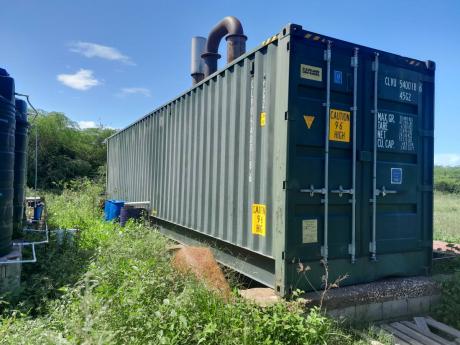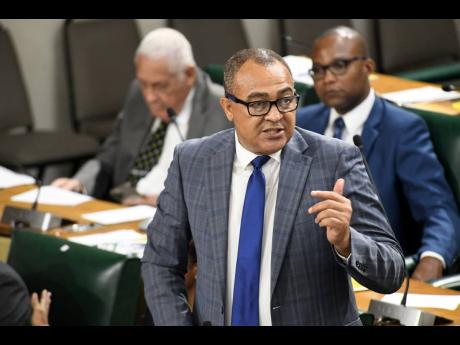MESSY HOLD-UP
Incinerator operators bemoan long wait for green light to process medical waste
As Jamaica battles an ever-growing medical waste disposal crisis, at least three private incinerator operations in St Catherine have been stalled due to long delays from environment overseers in granting permits. And the operators are furious.
The incinerators are located in and around Hartlands, a farming community in the parish, where last month residents protested the erection of a medical waste disposal unit in the area, and raised concerns about its environmental impact. That operation was later identified as belonging to Optimum Clean Solutions Limited.
In response to that Sunday Gleaner exposé, the National Environment and Planning Agency (NEPA) listed the three St Catherine entities – Optimum Clean Solutions Limited, Faithful Friends Pet Crematorium, and an expanded incinerator operation by the CEAC Outsourcing Company Limited – as companies awaiting permits to operate.
This is even as Health Minister Dr Christopher Tufton said the Government is looking at outsourcing medical waste disposal to overseas companies to aid efficiency of the Government’s central disposal facility on Drummond Street in downtown Kingston. The Sunday Gleaner understands that that facility is operating beyond its capacity.
NEPA told The Sunday Gleaner that there is a 10-point application checklist for private incinerator operators, which include a general overview of the project, proof of land ownership, description of fuel source, existing location, estimated zone of influence, and an assessment of potential impacts and proposed mitigation measures “with special emphasis on air pollution and odour generation”.
“Generally, considerations for the potential impacts of the development on public health and the environment are taken into account. These include the risks of air pollution, possible negative impacts of hazardous waste operation on the immediate environs, and fire and safety,” NEPA outlined, adding that “the review of such applications engages other relevant partners in the development application process”.
However, it is the back and forth between government agencies, particularly NEPA and the Ministry of Agriculture, that has the private operators on edge.
‘A LOT OF SCIENCE TO IT’
“A lot of people just buy an incinerator and put it down, but that is not how it goes. There is a lot of science to it; plus, it is very, very expensive,” offered Christopher Burgess, operator of CEAC Outsourcing Company, the sole entity contracted by the Ministry of Health and Wellness to aid in medical waste disposal islandwide.
Burgess has a permit for one incinerator but has applied for a second one for a much larger unit. Months later and after over $1 million in expenditures, he is still awaiting approval from the government agencies even after completing all the steps outlined in the application.
“I don’t have a timeline for when they will get back to me and it seems they don’t have a timeline either. Every country has these facilities and Jamaica needs these facilities as well. But there are persons in government, especially in the Ministry of Agriculture, who do not understand this,” he charged, stressing the exorbitant costs of sourcing the machinery and operating software, and conducting the relevant tests such as an agricultural impact assessment.
He argued that, unlike those of former years, modern incinerators are less dangerous than “a trailer travelling down the highway”, adding that despite the heavy costs, he does not support individuals who operate illegally.
“Almost every country in the world has these facilities that clean and incinerate the waste and treat it properly, but in Jamaica, some people in government think it is unsafe for us,” Burgess stated.
‘WE ARE NOT THE PROBLEM’
In early November, The Sunday Gleaner highlighted the dangers residents faced from a seemingly unregulated and unsecured medical waste disposal site on the outskirts of Hartlands in St Catherine.
On the day the news team visited the location, there was no perimeter fence or signs to indicate who the operators were or the nature of the activities. More than a dozen drums filled with ashes were seen as well as burnt debris scattered around the apparatus. Inside the drums, there were small charred glass vials and what appeared to be packets of expired tablets.
The rusting drums were sitting on the ground, contrary to environmental stipulations that such items are to be placed upon concrete flooring, The Sunday Gleaner understands.
Optimum Clean Solutions, which operates the unit, has now erected a fence around the property.
“All I can say is that we are supposed to be part of the solution. Not the problem. But we are being made to look like the problem,” said the owner, explaining that he feels he is being used as a scapegoat by the authorities. This was after spending millions of dollars to design and ship the equipment into the island.
“We are being portrayed as part of the problem when we are the biggest and only solution to the crisis facing the health sector right now,” he stressed, adding that he could face sanctions for certain breaches at the location which was no fault of his, as he had been waiting for a long time to get the necessary approvals.
However, NEPA told The Sunday Gleaner that Optimum Clean Solutions was issued its first cessation order for that location on August 10 this year pending an agricultural impact assessment. So far, there has been no air-quality testing in the general location, NEPA noted, making it unclear to what extent the community may be affected.
“Incinerators are regarded as heavy-industry activities and, as such, they are generally located in areas zoned for heavy industry, as per parish development order. However, each application is assessed on its own merit,” the agency said in response to queries from The Sunday Gleaner.
“Once a permit is issued, there are mandated self-assessment and reporting by the permittee, and a monitoring component, in which the frequency of the assessment is based on the conditions within the permit.”
According to the state entity, no other illegal incinerator operator had crossed its radars or has been sanctioned islandwide.
NEPA also said reports of medical waste being discarded in public landfills have gone unproven, even as various health facility operators explained to The Sunday Gleaner last week the increasing difficulty getting rid of their waste.
RESTRUCTURING OF THE MEDICAL WASTE PROCESS
“I am concerned that the management of our medical waste is very challenging, and that over the years the toxic waste has had to be stored,” Tufton told The Sunday Gleaner.
Dr Simone Spence, director of health promotion and protection in the health ministry, has promised a restructuring of the medical waste process.
New equipment is slated to be installed at the National Medical Waste Management Plant in downtown Kingston by the end of the financial year. This will complement existing incinerators, some of which are currently being operated at hospitals.
The downtown Kingston facility was established in 2012 at a cost of US$3 million. It is the island’s first state-of-the-art non-incineration automated medical waste plant and was expected to improve the management of waste from healthcare facilities, using a steam sterilisation and shredding technology.
“Nationally, there may be a problem, but for us, we have a fairly decent system,” noted Michael Bent, director of the Southern Regional Health Authority, which covers St Elizabeth, Manchester and Clarendon.
“We have some incinerators licensed by NEPA at Mandeville and at May Pen (hospitals). We have contracts with some private persons whenever we have excess and whenever the incinerators are down, which is not often. We also have some refrigerated containers that we store just in case. Thank God for that,” he told The Sunday Gleaner.






